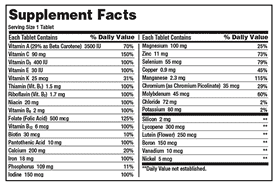MULTIVITAMIN SUPPLEMENTATION
According to the Food and Drug Administration, Congress defined the term “dietary supplement” in the Dietary Supplement Health and Education Act (DSHEA) of 1994.
A dietary supplement is a product taken by mouth that contains a “dietary ingredient” intended to SUPPLEMENT the diet. The ingredients of these products may include: vitamins, minerals, herbs or other botanicals, amino acids, and substances such as enzymes, organ tissues, glandulars, and metabolites. DSHEA places dietary supplements in a special category under the general umbrella of “foods,” not drugs.
Under DSHEA, the company that produces the dietary supplement is responsible for determining the supplement’s safety and that any representations or claims made about them are substantiated by adequate evidence to show that they are not false or misleading. This means that dietary supplements do not need approval from FDA before they are marketed.
Unlike drug products that must be proven safe and effective for their intended use before marketing, there are no provisions in the law for FDA to “approve” dietary supplements for safety or effectiveness before they reach the consumer. Once the product is marketed, FDA has the responsibility for showing that a dietary supplement is “unsafe,” before it can take action to restrict the product’s use or removal from the marketplace.
___________________________________________________________________
WHO MAY BENEFIT FROM SEVERAL NUTRIENTS IN MULTIVITAMINS?
Most people who have true vitamin deficiencies have underlying medical problems that either prevent absorption of a nutrient from the diet or its metabolism. For example, patients who have undergone a gastric bypass surgery, have been afflicted with malabsorption disorders, or suffer from chronic alcoholism are unable to obtain the right nutrients in their diet. It is best for most people to obtain vitamins and minerals from eating a well-rounded healthy diet.
However, some people benefit from certain vitamin supplementation. Pregnant women and women who might be pregnant are recommended folic acid supplementation, especially in the first trimester, to prevent neural tube defects in their babies. Pregnant women may also be recommended iron supplementation by their health care provider.
Patients that have vitamin D deficiency and/or suffer from osteoporosis or osteopenia are recommended Calcium and Vitamin D supplementation to help increase bone mineral density and decrease fractures in post-menopausal women.
People over age 50 tend not to absorb Vitamin B12 as well as vegans and they should obtain recommended intakes of vitamin B12 mainly from fortified foods or dietary supplements.
Individuals with poor nutrient intakes from diet alone, who consume low-calorie diets, or who avoid certain foods (such as strict vegetarians and vegans) might also benefit from taking multivitamins.
TOO MUCH OR TOO LITTLE? HOW DO YOU CHOOSE A MULTIVITAMIN?
When you are supplementing your diet with pill-form of multivitamins, how do you know if you are taking too much or too little?
Your doctor is the best person to ask about a supplement you are planning to take. In addition, the back of the vitamin bottle contains percentage of daily allowance of recommended supplement intake.
Special Considerations for Certain Population Groups
Most basic multivitamins usually contain both vitamins and minerals, mostly at levels that do not exceed the daily recommended values for these nutrients. However, people who take multivitamins and other supplements and who eat fortified foods and beverages might consume some nutrients at levels that exceeding the upper level of recommended intake, which increases the possibility of adverse effects.
Smokers and, possibly, former smokers should avoid multivitamins that contain a large amount of beta-carotene or vitamin A due to an increased risk of lung cancer, as it has been suggested in several studies.
Taking excess vitamin A (as preformed retinol but not beta-carotene) during pregnancy can increase the risk of birth defects in infants. In general population, over-consumption of vitamin A can cause staining of skin a yellow-orange color, loss of hair, developing dry and scaly skin, mouth sores, anorexia, vomiting, nausea, abdominal pain, and headaches.
Over-consumption of Vitamin D can cause high blood calcium levels, kidney stones from high blood and urine calcium levels, anemia, and kidney failure.
Information about different dietary supplements can be obtained online by reviewing dietary supplement fact sheets at National Institute of Health website:





